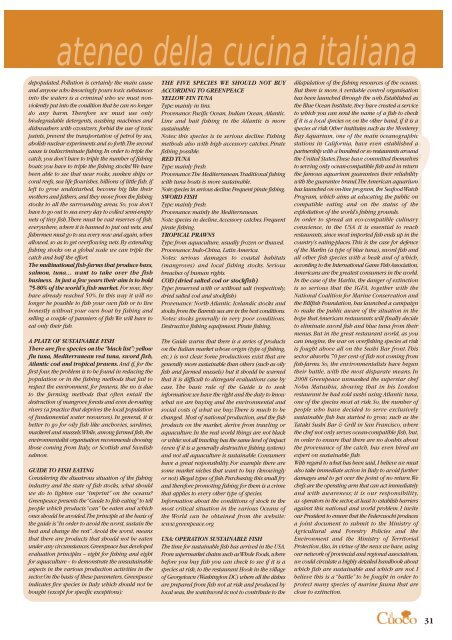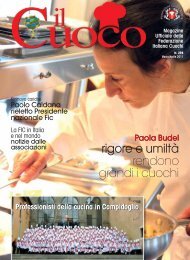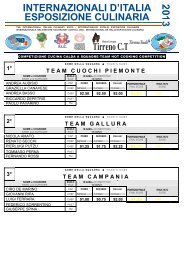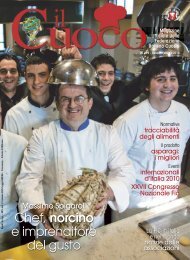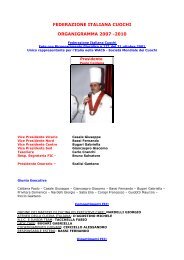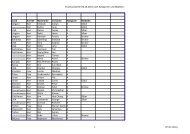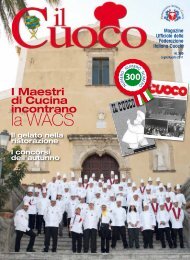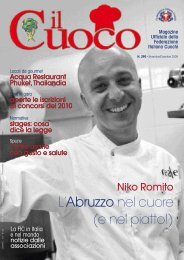Scarica versione PDF - Federazione Italiana Cuochi
Scarica versione PDF - Federazione Italiana Cuochi
Scarica versione PDF - Federazione Italiana Cuochi
You also want an ePaper? Increase the reach of your titles
YUMPU automatically turns print PDFs into web optimized ePapers that Google loves.
ateneo della cucina italiana<br />
depopulated. Pollution is certainly the main cause<br />
and anyone who knowingly pours toxic substances<br />
into the waters is a criminal who we must nonviolently<br />
put into the condition that he can no longer<br />
do any harm. Therefore we must use only<br />
biodegradable detergents, washing machines and<br />
dishwashers with ozonizers, forbid the use of toxic<br />
paints, prevent the transportation of petrol by sea,<br />
abolish nuclear experiments and so forth. The second<br />
cause is indiscriminate fishing. In order to triple the<br />
catch, you don’t have to triple the number of fishing<br />
boats: you have to triple the fishing stocks! We have<br />
been able to see that near rocks, sunken ships or<br />
coral reefs, sea life flourishes, billions of little fish, if<br />
left to grow undisturbed, become big like their<br />
mothers and fathers, and they move from the fishing<br />
stocks to all the surrounding areas. So, you don’t<br />
have to go out to sea every day to collect semi-empty<br />
nets of tiny fish. There must be vast reserves of fish,<br />
everywhere, where it is banned to put out nets, and<br />
fishermen must go to sea every now and again, when<br />
allowed, so as to get overflowing nets. By extending<br />
fishing stocks on a global scale we can triple the<br />
catch and half the effort.<br />
The multinational fish-farms that produce bass,<br />
salmon, tuna… want to take over the fish<br />
business. In just a few years their aim is to hold<br />
75-80% of the world’s fish market. For now, they<br />
have already reached 50%. In this way it will no<br />
longer be possible to fish your own fish or to live<br />
honestly without your own boat by fishing and<br />
selling a couple of panniers of fish. We will have to<br />
eat only their fish.<br />
A PLATE OF SUSTAINABLE FISH<br />
There are five species on the “black list”: yellow<br />
fin tuna, Mediterranean red tuna, sword fish,<br />
Atlantic cod and tropical prawns. And if, for the<br />
first four, the problem is to be found in reducing the<br />
population or in the fishing methods that fail to<br />
respect the environment, for prawns, the no is due<br />
to the farming methods that often entail the<br />
destruction of mangrove forests and even de-routing<br />
rivers (a practice that deprives the local population<br />
of fundamental water resources). In general, it is<br />
better to go for oily fish like anchovies, sardines,<br />
mackerel and mussels. While, among farmed fish, the<br />
environmentalist organisation recommends choosing<br />
those coming from Italy, or Scottish and Swedish<br />
salmon.<br />
GUIDE TO FISH EATING<br />
Considering the disastrous situation of the fishing<br />
industry and the state of fish stocks, what should<br />
we do to lighten our “imprint” on the oceans<br />
Greenpeace presents the “Guide to fish eating” to tell<br />
people which products “can” be eaten and which<br />
ones should be avoided. The principle at the basis of<br />
the guide is “In order to avoid the worst, sustain the<br />
best and change the rest”. Avoid the worst, means<br />
that there are products that should not be eaten<br />
under any circumstances. Greenpeace has developed<br />
evaluation principles – eight for fishing and eight<br />
for aquaculture – to demonstrate the unsustainable<br />
aspects in the various production activities in the<br />
sector. On the basis of these parameters, Greenpeace<br />
indicates five species in Italy which should not be<br />
bought (except for specific exceptions):<br />
THE FIVE SPECIES WE SHOULD NOT BUY<br />
ACCORDING TO GREENPEACE<br />
YELLOW FIN TUNA<br />
Type: mainly in tins.<br />
Provenance: Pacific Ocean, Indian Ocean, Atlantic.<br />
Line and bait fishing in the Atlantic is more<br />
sustainable.<br />
Notes: this species is in serious decline. Fishing<br />
methods also with high accessory catches. Pirate<br />
fishing possible.<br />
RED TUNA<br />
Type: mainly fresh.<br />
Provenance: The Mediterranean. Traditional fishing<br />
with tuna boats is more sustainable.<br />
Note: species in serious decline. Frequent pirate fishing.<br />
SWORD FISH<br />
Type: mainly fresh.<br />
Provenance: mainly the Mediterranean.<br />
Note: species in decline. Accessory catches. Frequent<br />
pirate fishing.<br />
TROPICAL PRAWNS<br />
Type: from aquaculture, usually frozen or thawed.<br />
Provenance: Indo-China, Latin America.<br />
Notes: serious damages to coastal habitats<br />
(mangroves) and local fishing stocks. Serious<br />
breaches of human rights.<br />
COD (dried salted cod or stockfish)<br />
Type: preserved with or without salt (respectively,<br />
dried salted cod and stockfish)<br />
Provenance: North Atlantic. Icelandic stocks and<br />
stocks from the Barents sea are in the best conditions.<br />
Notes: stocks generally in very poor conditions.<br />
Destructive fishing equipment. Pirate fishing.<br />
The Guide warns that there is a series of products<br />
on the Italian market whose origin (type of fishing,<br />
etc.) is not clear. Some productions exist that are<br />
generally more sustainable than others (such as oily<br />
fish and farmed mussels) but it should be warned<br />
that it is difficult to disregard evaluations case by<br />
case. The basic rule of the Guide is to seek<br />
information: we have the right and the duty to know<br />
what we are buying and the environmental and<br />
social costs of what we buy. There is much to be<br />
changed. Most of national production, and the fish<br />
products on the market, derive from trawling or<br />
aquaculture. In the real world things are not black<br />
or white: not all trawling has the same level of impact<br />
(even if it is a generally destructive fishing system)<br />
and not all aquaculture is sustainable. Consumers<br />
have a great responsibility. For example there are<br />
some market niches that want to buy (knowingly<br />
or not) illegal types of fish. Purchasing this small fry<br />
and therefore promoting fishing for them is a crime<br />
that applies to every other type of species.<br />
Information about the conditions of stock in the<br />
most critical situation in the various Oceans of<br />
the World can be obtained from the website:<br />
www.greenpeace.org<br />
USA: OPERATION SUSTAINABLE FISH<br />
The time for sustainable fish has arrived in the USA.<br />
From supermarket chains such as Whole Foods, where<br />
before you buy fish you can check to see if it is a<br />
species at risk, to the restaurant Hook in the village<br />
of Georgetown (Washington DC) where all the dishes<br />
are prepared from fish not at risk and produced by<br />
local seas, the watchword is: not to contribute to the<br />
dilapidation of the fishing resources of the oceans.<br />
But there is more. A veritable control organisation<br />
has been launched through the web. Established as<br />
the Blue Ocean Institute, they have created a service<br />
to which you can send the name of a fish to check<br />
if it is a local species or, on the other hand, if it is a<br />
species at risk. Other institutes such as the Monterey<br />
Bay Aquarium, one of the main oceanographic<br />
stations in California, have even established a<br />
partnership with a hundred or so restaurants around<br />
the United States. These have committed themselves<br />
to serving only ocean-compatible fish and in return<br />
the famous aquarium guarantees their reliability<br />
with the guarantee brand. The American aquarium<br />
has launched on on-line program, the Seafood Watch<br />
Program, which aims at educating the public on<br />
compatible eating and on the status of the<br />
exploitation of the world’s fishing grounds.<br />
In order to spread an eco-compatible culinary<br />
conscience, in the USA it is essential to reach<br />
restaurants, since most imported fish ends up in the<br />
country’s eating-places. This is the case for defence<br />
of the Marlin (a type of blue tuna), sword fish and<br />
all other fish species with a beak and of which,<br />
according to the International Game Fish Association,<br />
Americans are the greatest consumers in the world.<br />
In the case of the Marlin, the danger of extinction<br />
is so serious that the IGFA, together with the<br />
National Coalition for Marine Conservation and<br />
the Billfish Foundation, has launched a campaign<br />
to make the public aware of the situation in the<br />
hope that American restaurants will finally decide<br />
to eliminate sword fish and blue tuna from their<br />
menus. But in the great restaurant world, as you<br />
can imagine, the war on overfishing species at risk<br />
is fought above all on the Sushi Bar front. This<br />
sector absorbs 70 per cent of fish not coming from<br />
fish-farms. So, the environmentalists have begun<br />
their battle, with the most disparate means. In<br />
2008 Greenpeace unmasked the superstar chef<br />
Nobu Matushia, showing that in his London<br />
restaurant he had sold sushi using Atlantic tuna,<br />
one of the species most at risk. So, the number of<br />
people who have decided to serve exclusively<br />
sustainable fish has started to grow, such as the<br />
Tataki Sushi Bar & Grill in San Francisco, where<br />
the chef not only serves ocean-compatible fish, but,<br />
in order to ensure that there are no doubts about<br />
the provenance of the catch, has even hired an<br />
expert on sustainable fish.<br />
With regard to what has been said, I believe we must<br />
also take immediate action in Italy to avoid further<br />
damages and to get over the point of no return. We<br />
chefs are the operating arm that can act immediately<br />
and with awareness; it is our responsibility,<br />
as operators in the sector, at least to establish barriers<br />
against this national and world problem. I invite<br />
our President to ensure that the Federcuochi produces<br />
a joint document to submit to the Ministry of<br />
Agricultural and Forestry Policies and the<br />
Environment and the Ministry of Territorial<br />
Protection. Also, in virtue of the news we have, using<br />
our network of provincial and regional associations,<br />
we could circulate a highly detailed handbook about<br />
which fish are sustainable and which are not. I<br />
believe this is a “battle” to be fought in order to<br />
protect many species of marine fauna that are<br />
close to extinction.<br />
d<br />
31


